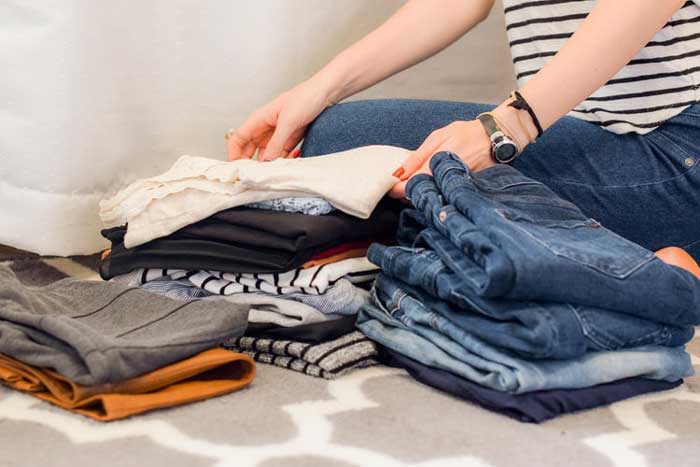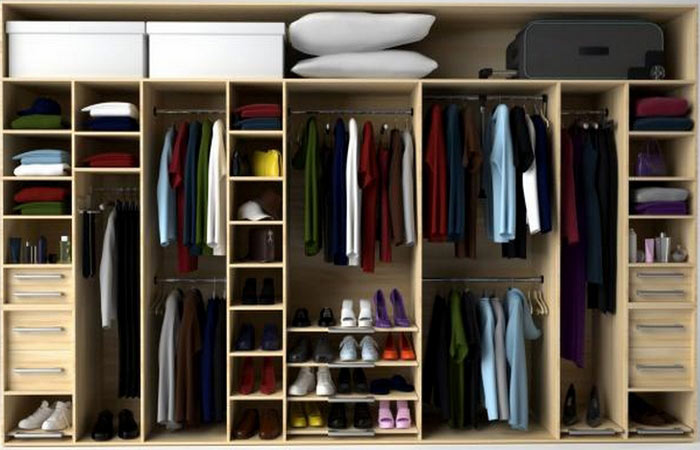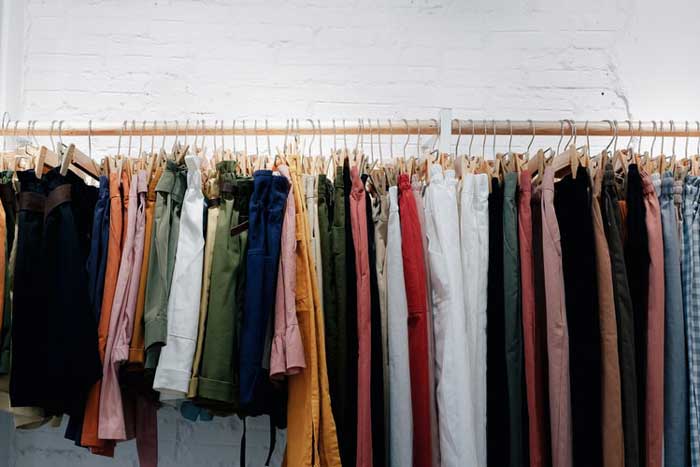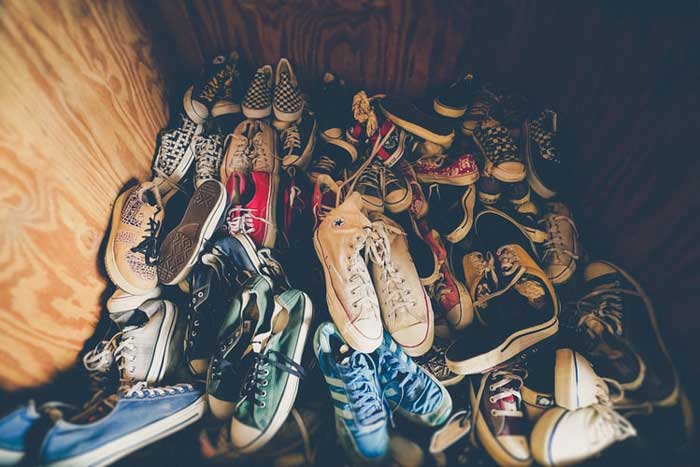Your environment is sure to include a few people who are too reverent about their possessions. All attempts to persuade them to get rid of a part of the unnecessary or broken things end up with their phrase “It may still come in handy” and their masked resentment. It is much worse, if such a behavior is observed in someone close. Over time, their passion for “hoarding” begins to literally drive you out of the apartment and threatens to ruin the relationships for a long time. What should you do in this case and is it possible to get rid of this problem?
 Wardrobes are filled to the bursting point, and it’s not easy to get something you need from there. Sorting out the things begins with a long and tedious process of just relocating them. Sometimes you hear that it would be useful to get rid of the unwanted items, but in the end everything remains in its place… What is the hoarding syndrome of “painful parting with things” like and how to defeat it?
Wardrobes are filled to the bursting point, and it’s not easy to get something you need from there. Sorting out the things begins with a long and tedious process of just relocating them. Sometimes you hear that it would be useful to get rid of the unwanted items, but in the end everything remains in its place… What is the hoarding syndrome of “painful parting with things” like and how to defeat it?
Do not forget that while you are waiting for an opportunity, things are losing their relevance and value. They just occupy space on the shelf and litter your apartment. Life is too short to postpone (or save) everything until “better times”, denying yourself the pleasure of enjoying what you need right now. Therefore, learn to let go of unnecessary stuff without regret.
How to identify signs of unwillingness to part with things?
“What if it comes in handy?”
This is the favorite phrase of many space organizers. Therefore, you end up having piles of bed linen, toys abandoned by grown up kids, and clothes that no one needs. This negative attitude comes from the time when the thing itself was very valuable. If you queued to get it, saved and stored it, there will be no other thing like that! But the deficit is long gone, and we are living in the world of overabundance of everything. So let’s turn on the logic and honestly answer the question – if you have not used something for more than a year and can’t immediately recall under what conditions it may be useful, does it mean that you will not need this thing in 99% of cases? By the way, even if there is a small probability of still needing it, is it worth the wait? Is life really going to be so bad that you will not be able to buy something you need? Do not program yourself for such a scenario, clear your life from doubts and excess trash.
“What if I lose/gain weight or just keep it until better times?”
This paragraph continues the previous thought. “The thing seems to be good, but I’m still not good enough for it!” If you do not change the situation in the nearest future, there is no point in storing it. While you are waiting for the occasion, the clothes are losing their relevance, their value and simply occupy the shelf. The same applies not only to clothes, but also to dishes, furniture, toys – any “expensive” items. Life is too short to wait for better times and deny yourself the pleasure of using good things right now.
The feeling of guilt

This often applies to the gifts that were not useful or were disliked, the expensive things that were bought on emotions or spontaneously. In the end, they never brought you benefit or pleasure. For example, there is a huge washing vacuum cleaner: it takes half a room, it is difficult to get and use. Then there is the torture of washing and putting it back. And you want it to be ready immediately! Or there is that ugly vase presented by your grandmother. Or the magnets brought by friends from all over the world and covering the whole of your refrigerator.
It seems that these things are not needed, but it’s a shame to give away or sell them because they either cost a lot or because close people gave them to you. However, an item does not cost anything if it lies unused. And the value of a gift survives the sheer moment of giving, the moment of exchange of positive emotions and attention. After that it becomes a usual thing, and you have the right to do anything with it. By letting go of unnecessary junk, you can let go your feeling of guilt.
Flashback items
Now, this is always more difficult and painful. A wedding dress, children’s drawings and crafts, seashells from your seafront rest. Of course, you can keep all of this and enjoy it by sometimes looking at these things. But if old things already take up too much space and turn into lumber, think about getting rid of them. After all, good memories are stored in our hearts and in photographs, not in objects.
How to stop collecting everything and learn to painlessly part with things?

Stop associating things with people. Experts remind that things should not cause the same strong emotional attachment as people. In other words, many individuals who are prone to a pathological hoarding syndrome endow some objects with “living qualities,” and then simply cannot psychologically part with them. It seems to them that by doing so they will offend the things and will never forgive themselves for doing so. Remind yourself that these are inanimate things that you can easily share / sell / give away or even throw away, thereby freeing your apartment (and yourself) from the trash.
Do not get fooled by ads and do not buy unnecessary stuff. Do you really need that blouse that is sold with a very similar one? Or the tenth jar of a cleaning agent, which, according to the advertising, will cost you half as much? If you can still come to terms with products (although they will also take up space until you use them all), everything is not so simple with clothes / shoes / accessories.
For example, there are people who manically buy shoes, regardless of whether they are going to wear them or not. In the end, their house is so littered with all the shoe boxes that there is nowhere to keep this lumber. At the same time, the people proudly show their collection, rejoicing that they managed to snatch all the most fashionable and relevant footwear. But the question is, what for? Their apartment will eventually resemble a subsidiary of a shoe factory. Or just a warehouse of unnecessary shoes. Therefore, try to protect yourself from impulsive purchases and do not take a thing if you are not sure that you will really use it. A good way to check is to put aside the product you like and walk around for an hour. If the desire to purchase the thing has not vanished, you can go back and get it. This is how you can protect yourself from unnecessary expenses.

Get rid of different garbage immediately. In your house, you can also find waste papers, such as old newspapers or advertising booklets that need to be thrown away, but still there is no time for this. Make a point of sending to trash all the papers that have lost their relevance. You will not litter the surrounding space and will spend much less time cleaning the apartment.
Teach yourself not to panic when cleaning or sorting things. If you cannot cope with your lumber yourself and are about to experience a fear or panic attack, invite someone to help you with this difficult task. Try not to grab all things, demanding to return them to their original place. Tell yourself that this does not pose a threat to you, and no one is invading your personal space. On the contrary, people want to help you save more room for something new and positive.
Look for positive emotions in something else rather than things. Try not to shield yourself from friends and acquaintances, spending all your time and energy on cluttering up your apartment. Go out more often, look for something that will inspire and motivate you (besides impulsive shopping, of course). Without doubt, there are much more important (and more interesting) things in life than “hoarding”.










